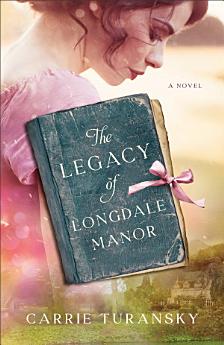The Legacy of Longdale Manor
កញ្ញា 2023 · Baker Books
5.0star
ការវាយតម្លៃ 4report
សៀវភៅអេឡិចត្រូនិច
352
ទំព័រ
family_home
មានសិទ្ធិ
info
reportការវាយតម្លៃ និងមតិវាយតម្លៃមិនត្រូវបានផ្ទៀងផ្ទាត់ទេ ស្វែងយល់បន្ថែម
អំពីសៀវភៅអេឡិចត្រូនិកនេះ
2024 Carol Award Winner
Two women--a century apart--embark on a journey to healing, faith, forgiveness, and romance.
In 2012, art historian Gwen Morris travels to England's Lake District to appraise the paintings and antiques of an old family friend, hoping to prove herself to her prestigious grandfather. While at Longdale Manor, she meets David Bradford--the owner's handsome grandson--who is desperate to save the crumbling estate by turning it into a luxury hotel. When Gwen stumbles upon a one-hundred-year-old journal and an intricately carved shepherd's staff similar to one in a photo of her parents, she's left searching for answers.
In 1912, after her father's death, Charlotte Harper uncovers a painful family secret she can only confess to her journal. She and her family travel to the Lake District to stay on a sheep farm, hoping eventually to find a home with Charlotte's grandfather at Longdale Manor, but old wounds and bitter regrets make it a difficult challenge. As Charlotte grows closer to shepherd Ian Storey and rebuilds her shattered faith, she must decide whether she will ever trust in love again.
Praise for The Legacy of Longdale Manor
"This novel will stir your faith--and your desire to visit England's Lake District!"--JULIE KLASSEN, bestselling author
"Turansky opens the door of Longdale Manor and invites readers to explore the secrets hidden inside."--MELANIE DOBSON, award-winning author
"A beautiful book to warm and lift the heart."--CATHY GOHLKE, Christy Hall of Fame author
Two women--a century apart--embark on a journey to healing, faith, forgiveness, and romance.
In 2012, art historian Gwen Morris travels to England's Lake District to appraise the paintings and antiques of an old family friend, hoping to prove herself to her prestigious grandfather. While at Longdale Manor, she meets David Bradford--the owner's handsome grandson--who is desperate to save the crumbling estate by turning it into a luxury hotel. When Gwen stumbles upon a one-hundred-year-old journal and an intricately carved shepherd's staff similar to one in a photo of her parents, she's left searching for answers.
In 1912, after her father's death, Charlotte Harper uncovers a painful family secret she can only confess to her journal. She and her family travel to the Lake District to stay on a sheep farm, hoping eventually to find a home with Charlotte's grandfather at Longdale Manor, but old wounds and bitter regrets make it a difficult challenge. As Charlotte grows closer to shepherd Ian Storey and rebuilds her shattered faith, she must decide whether she will ever trust in love again.
Praise for The Legacy of Longdale Manor
"This novel will stir your faith--and your desire to visit England's Lake District!"--JULIE KLASSEN, bestselling author
"Turansky opens the door of Longdale Manor and invites readers to explore the secrets hidden inside."--MELANIE DOBSON, award-winning author
"A beautiful book to warm and lift the heart."--CATHY GOHLKE, Christy Hall of Fame author
ការដាក់ផ្កាយ និងមតិវាយតម្លៃ
5.0
ការវាយតម្លៃ 4
អំពីអ្នកនិពន្ធ
Carrie Turansky is the award-winning author of twenty-one inspirational novels and novellas and a winner of the Carol Award, the International Digital Award, and the HOLT Medallion. She loves traveling to England to research her Edwardian novels, including No Journey Too Far, No Ocean Too Wide, Across the Blue, and the Edwardian Brides series. Her novels have been translated into several languages and have received starred reviews from Christianbook.com and Library Journal. Learn more at carrieturansky.com.
វាយតម្លៃសៀវភៅអេឡិចត្រូនិកនេះ
ប្រាប់យើងអំពីការយល់ឃើញរបស់អ្នក។
អានព័ត៌មាន
ទូរសព្ទឆ្លាតវៃ និងថេប្លេត
ដំឡើងកម្មវិធី Google Play Books សម្រាប់ Android និង iPad/iPhone ។ វាធ្វើសមកាលកម្មដោយស្វ័យប្រវត្តិជាមួយគណនីរបស់អ្នក និងអនុញ្ញាតឱ្យអ្នកអានពេលមានអ៊ីនធឺណិត ឬគ្មានអ៊ីនធឺណិតនៅគ្រប់ទីកន្លែង។
កុំព្យូទ័រយួរដៃ និងកុំព្យូទ័រ
អ្នកអាចស្ដាប់សៀវភៅជាសំឡេងដែលបានទិញនៅក្នុង Google Play ដោយប្រើកម្មវិធីរុករកតាមអ៊ីនធឺណិតក្នុងកុំព្យូទ័ររបស់អ្នក។
eReaders និងឧបករណ៍ផ្សេងទៀត
ដើម្បីអាននៅលើឧបករណ៍ e-ink ដូចជាឧបករណ៍អានសៀវភៅអេឡិចត្រូនិក Kobo អ្នកនឹងត្រូវទាញយកឯកសារ ហើយផ្ទេរវាទៅឧបករណ៍របស់អ្នក។ សូមអនុវត្តតាមការណែនាំលម្អិតរបស់មជ្ឈមណ្ឌលជំនួយ ដើម្បីផ្ទេរឯកសារទៅឧបករណ៍អានសៀវភៅអេឡិចត្រូនិកដែលស្គាល់។







